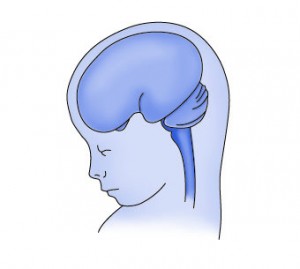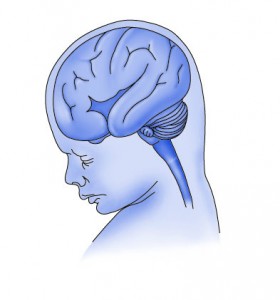 Pregnancy can be divided generally into three trimesters. During the first trimester, Organogenesis takes place. During these first 10 weeks of gestation, organs are being formed, including the brain and spinal cord (See Chapter 3). Early exposure to alcohol, especially if the woman doesn’t know if she is pregnant, can lead to physical defects, such as facial dysmorphologies, a curved spine, and problems with visceral organs. Typically, the growth retardation and small head circumference occur with the highest doses of alcohol consumed. During the first trimester, cell division and protein synthesis are reduced; these cellular functions are crucial in the formation of skeletal muscle, bone, and internal or gans, including the brain. The disruption of the brain formation at this time is due to the ability of alcohol to decrease the proliferation of neurons.
Pregnancy can be divided generally into three trimesters. During the first trimester, Organogenesis takes place. During these first 10 weeks of gestation, organs are being formed, including the brain and spinal cord (See Chapter 3). Early exposure to alcohol, especially if the woman doesn’t know if she is pregnant, can lead to physical defects, such as facial dysmorphologies, a curved spine, and problems with visceral organs. Typically, the growth retardation and small head circumference occur with the highest doses of alcohol consumed. During the first trimester, cell division and protein synthesis are reduced; these cellular functions are crucial in the formation of skeletal muscle, bone, and internal or gans, including the brain. The disruption of the brain formation at this time is due to the ability of alcohol to decrease the proliferation of neurons.
 During the second and third trimesters, there is a growth spurt of the musculoskeletal system and visceral organs, including the brain. The major brain cells, Neurons and Glial Cells, grow and establish their branches and connections. The long axons of neurons become surrounded by Myelin, which allows the neurons to send electrical information along the long length of the Axon. When a woman drinks alcohol during these periods, the fetus can develop neuronal abnormalities leading to behavioral and learning deficits (see Chapter 3 for more detail) without any manifestation of the physical dysmorphologies. There is a common misconception that the absence of the facial dysmorphologies means that the child’s exposure to alcohol was minimal, and therefore, the child has a milder form of FASD. On the contrary, drinking during the 2nd and 3rd trimesters can produce children with severe behavioral and neuropsychological dysfunction even in the absence of facial dysmorphologies.
During the second and third trimesters, there is a growth spurt of the musculoskeletal system and visceral organs, including the brain. The major brain cells, Neurons and Glial Cells, grow and establish their branches and connections. The long axons of neurons become surrounded by Myelin, which allows the neurons to send electrical information along the long length of the Axon. When a woman drinks alcohol during these periods, the fetus can develop neuronal abnormalities leading to behavioral and learning deficits (see Chapter 3 for more detail) without any manifestation of the physical dysmorphologies. There is a common misconception that the absence of the facial dysmorphologies means that the child’s exposure to alcohol was minimal, and therefore, the child has a milder form of FASD. On the contrary, drinking during the 2nd and 3rd trimesters can produce children with severe behavioral and neuropsychological dysfunction even in the absence of facial dysmorphologies.

Thus, when alcohol is consumed chronically throughout pregnancy , there is a wide variety of effects on the fetus, ranging from injury to the central nervous system, musculoskeletal damage, to growth retardation. In cases of episodic binge drinking, injury to the brain and other organs may be more selective. Damage to specific organs (including the brain) will depend on whether the particular organ is undergoing a growth spurt at the time the alcohol binge takes place. A more detailed discussion of the effect of prenatal alcohol drinking on brain development is found in Chapter 3.
 Adapted from Streissguth, 1997.
Adapted from Streissguth, 1997.